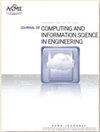面向能耗最小化的无人潜航器船体形态人工智能辅助设计(AIAD)
IF 2.6
3区 工程技术
Q2 COMPUTER SCIENCE, INTERDISCIPLINARY APPLICATIONS
Journal of Computing and Information Science in Engineering
Pub Date : 2023-06-02
DOI:10.1115/1.4062661
引用次数: 0
摘要
设计优良的船体以降低UUV航行的路径能量消耗是提高UUV能量续航能力的关键。然而,由于UUV与海流之间的相对速度和攻角在整个路径中会频繁变化,实现基于路径能耗的UUV船体设计将导致巨大的计算量。在这项工作中,基于人工智能辅助设计(AIAD)的思想,我们成功地开发了一种用于UUV船体设计的数据驱动设计方法。具体而言,我们首先开发并实现了深度学习(DL)算法,用于预测不同船体形状的UUV在不同速度和攻角下的阻抗。通过混合DL算法并将粒子群优化(PSO)算法引入到UUV船体设计中,提出了一种数据驱动的AIAD方法。在此基础上进行了基于路径能耗的实验,设计结果表明,该设计方法在克服高设计工作量的同时保持了效率和可靠性。本文章由计算机程序翻译,如有差异,请以英文原文为准。
Artificial Intelligence Aided Design (AIAD) of Hull Form of Unmanned Underwater Vehicles (UUVs) for Minimization of Energy Consumption
Designing an excellent hull to reduce the path energy consumption of UUV sailing is crucial to improving UUV energy endurance. However, due to the relative velocity and attack angle between the UUV and the ocean current will frequently change during the entire path, realizing a path energy consumption-based UUV hull design will result in a tremendous amount of calculation. In this work, based on the idea of articial intelligence-aided design (AIAD), we have successfully developed a data-driven design methodology for UUV hull design. Specically, we first developed and implemented deep learning (DL) algorithm for predicting the resis- tance of the UUV with different hull shapes under different velocities and attack angles. By mixing the proposed DL algorithm and introducing the particle swarm optimization (PSO) algorithm into the UUV hull design, we proposed a data-driven AIAD methodology. A path energy consumption-based experiment has been conducted based on the proposed method- ology, where the design results showed that the proposed design methodology maintains eciency and reliability while overcoming the high design workload.
求助全文
通过发布文献求助,成功后即可免费获取论文全文。
去求助
来源期刊
CiteScore
6.30
自引率
12.90%
发文量
100
审稿时长
6 months
期刊介绍:
The ASME Journal of Computing and Information Science in Engineering (JCISE) publishes articles related to Algorithms, Computational Methods, Computing Infrastructure, Computer-Interpretable Representations, Human-Computer Interfaces, Information Science, and/or System Architectures that aim to improve some aspect of product and system lifecycle (e.g., design, manufacturing, operation, maintenance, disposal, recycling etc.). Applications considered in JCISE manuscripts should be relevant to the mechanical engineering discipline. Papers can be focused on fundamental research leading to new methods, or adaptation of existing methods for new applications.
Scope: Advanced Computing Infrastructure; Artificial Intelligence; Big Data and Analytics; Collaborative Design; Computer Aided Design; Computer Aided Engineering; Computer Aided Manufacturing; Computational Foundations for Additive Manufacturing; Computational Foundations for Engineering Optimization; Computational Geometry; Computational Metrology; Computational Synthesis; Conceptual Design; Cybermanufacturing; Cyber Physical Security for Factories; Cyber Physical System Design and Operation; Data-Driven Engineering Applications; Engineering Informatics; Geometric Reasoning; GPU Computing for Design and Manufacturing; Human Computer Interfaces/Interactions; Industrial Internet of Things; Knowledge Engineering; Information Management; Inverse Methods for Engineering Applications; Machine Learning for Engineering Applications; Manufacturing Planning; Manufacturing Automation; Model-based Systems Engineering; Multiphysics Modeling and Simulation; Multiscale Modeling and Simulation; Multidisciplinary Optimization; Physics-Based Simulations; Process Modeling for Engineering Applications; Qualification, Verification and Validation of Computational Models; Symbolic Computing for Engineering Applications; Tolerance Modeling; Topology and Shape Optimization; Virtual and Augmented Reality Environments; Virtual Prototyping

 求助内容:
求助内容: 应助结果提醒方式:
应助结果提醒方式:


